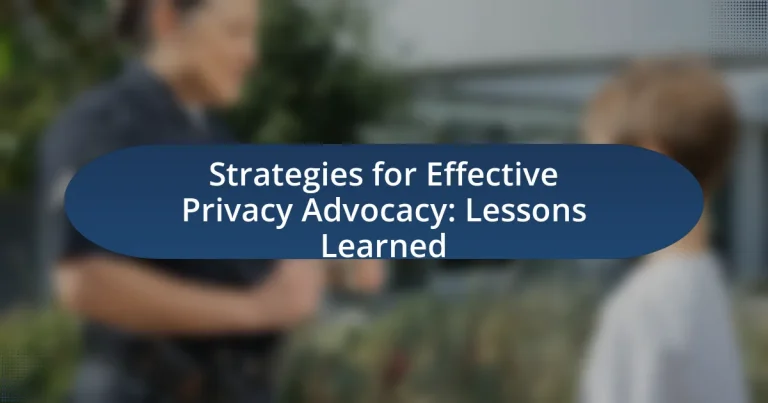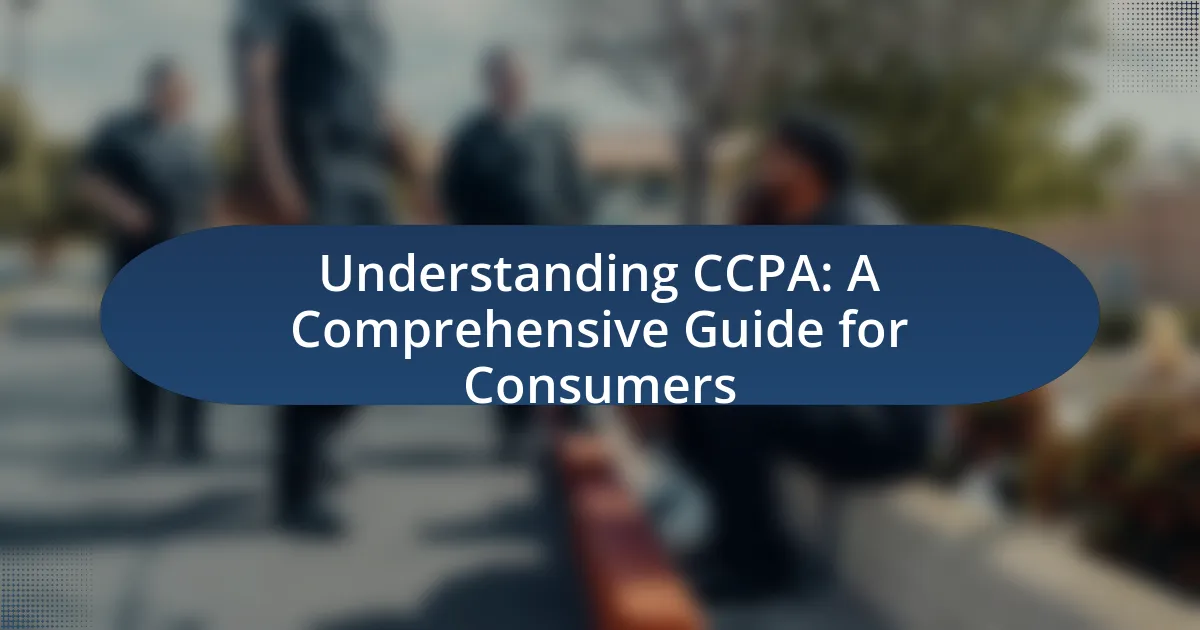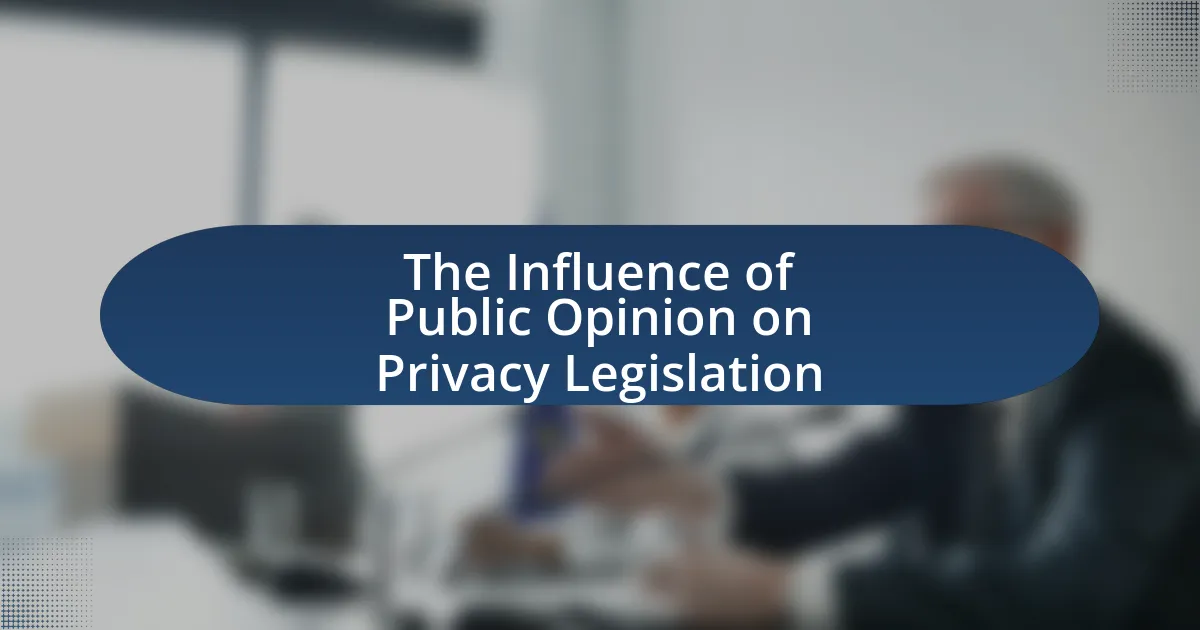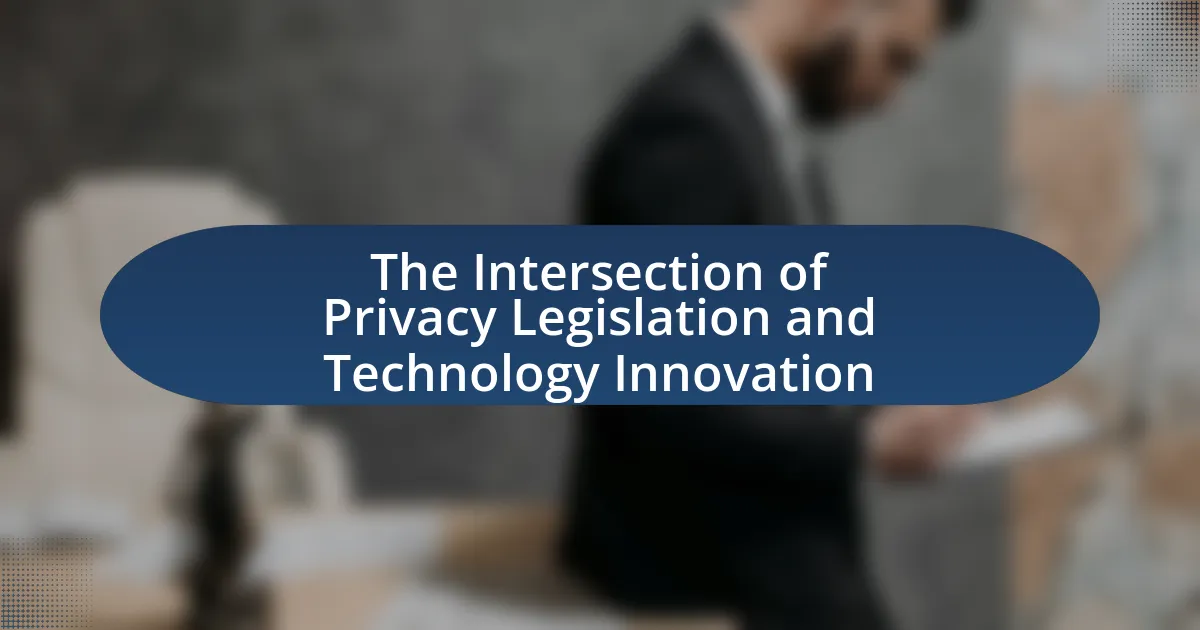The article focuses on effective strategies for privacy advocacy, emphasizing the importance of raising public awareness, engaging in policy advocacy, building coalitions, and utilizing data-driven arguments. It discusses how understanding privacy laws, such as the General Data Protection Regulation (GDPR) and the California Consumer Privacy Act (CCPA), enhances advocacy efforts and shapes strategies. The article also highlights the significance of public engagement in influencing policy changes, the role of partnerships among various organizations, and the common challenges faced by advocates. Additionally, it outlines best practices, innovative approaches, and practical tips for enhancing privacy advocacy efforts in a rapidly evolving digital landscape.
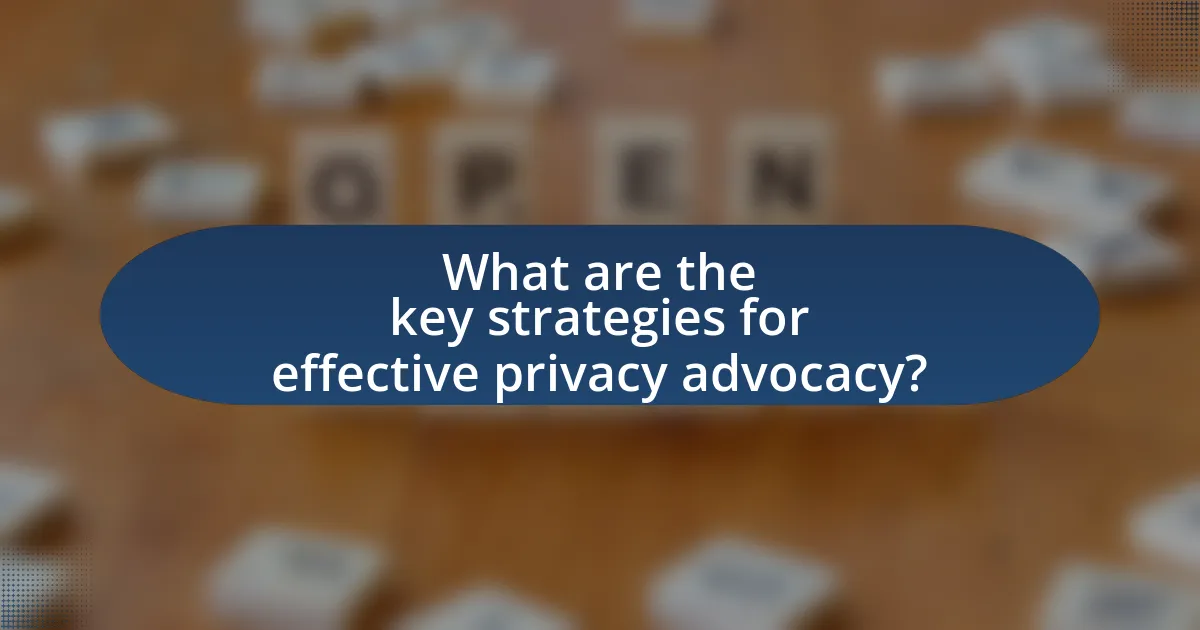
What are the key strategies for effective privacy advocacy?
Key strategies for effective privacy advocacy include raising public awareness, engaging in policy advocacy, building coalitions, and utilizing data-driven arguments. Raising public awareness involves educating individuals about their privacy rights and the implications of data misuse, which can be supported by statistics showing the increase in data breaches and privacy violations. Engaging in policy advocacy requires influencing legislation and regulations that protect privacy, as evidenced by successful campaigns that led to the implementation of laws like the General Data Protection Regulation (GDPR) in Europe. Building coalitions with other organizations amplifies the advocacy efforts, leveraging diverse resources and expertise to create a stronger voice for privacy rights. Finally, utilizing data-driven arguments strengthens the case for privacy protections by providing concrete evidence of the risks associated with inadequate privacy measures, such as studies demonstrating the financial and emotional impact of identity theft on individuals.
How can understanding privacy laws enhance advocacy efforts?
Understanding privacy laws enhances advocacy efforts by equipping advocates with the knowledge to navigate legal frameworks effectively. This understanding allows advocates to identify potential violations, articulate the implications of privacy breaches, and mobilize support for policy changes. For instance, familiarity with the General Data Protection Regulation (GDPR) enables advocates to highlight how non-compliance can harm individuals and communities, thereby strengthening their arguments for stricter enforcement and reform. Additionally, knowledge of privacy laws fosters collaboration with legal experts, enhancing the credibility and impact of advocacy campaigns.
What specific privacy laws should advocates be aware of?
Advocates should be aware of the General Data Protection Regulation (GDPR), the California Consumer Privacy Act (CCPA), and the Health Insurance Portability and Accountability Act (HIPAA). The GDPR, enacted in 2018, establishes strict guidelines for data protection and privacy for individuals within the European Union, emphasizing user consent and data rights. The CCPA, effective from 2020, grants California residents rights regarding their personal information, including the right to know what data is collected and the right to delete it. HIPAA, enacted in 1996, sets standards for the protection of health information, ensuring patient privacy in healthcare settings. These laws are critical for advocates as they shape the landscape of privacy rights and data protection.
How do these laws impact privacy advocacy strategies?
Laws significantly shape privacy advocacy strategies by establishing the legal framework within which advocates operate. For instance, the General Data Protection Regulation (GDPR) in Europe has prompted privacy advocates to focus on compliance and transparency, encouraging organizations to adopt more robust data protection measures. This shift is evidenced by the increase in data subject rights awareness campaigns, which aim to educate individuals about their rights under such laws. Furthermore, laws like the California Consumer Privacy Act (CCPA) have led to localized advocacy efforts, as advocates tailor their strategies to address specific regional legal requirements and consumer concerns. These legal frameworks thus directly influence the priorities and methods of privacy advocacy, driving a more structured and informed approach to protecting individual privacy rights.
Why is public awareness crucial for privacy advocacy?
Public awareness is crucial for privacy advocacy because it empowers individuals to understand their rights and the implications of data misuse. When the public is informed about privacy issues, they are more likely to demand stronger protections and hold organizations accountable. Research indicates that in 2020, 79% of Americans expressed concern about how their data is being used, highlighting a significant public interest in privacy matters. This awareness drives legislative changes and encourages companies to adopt better privacy practices, ultimately leading to a more secure digital environment.
What methods can be used to raise public awareness about privacy issues?
To raise public awareness about privacy issues, organizations can utilize educational campaigns, social media outreach, and community workshops. Educational campaigns can inform the public about privacy rights and risks through brochures, websites, and informational videos, which have been shown to increase knowledge and engagement. Social media outreach leverages platforms like Twitter and Facebook to disseminate information quickly and widely, reaching diverse audiences; studies indicate that social media can significantly enhance public discourse on privacy topics. Community workshops provide interactive environments for individuals to learn about privacy protection strategies, fostering direct engagement and discussion, which research has shown to be effective in changing attitudes and behaviors regarding privacy.
How does public engagement influence policy changes?
Public engagement significantly influences policy changes by amplifying the voices of constituents, thereby shaping the priorities and actions of policymakers. When citizens actively participate in discussions, provide feedback, or mobilize around specific issues, they create pressure on government officials to respond to public concerns. For instance, the 2017 protests against the repeal of the Affordable Care Act demonstrated how organized public engagement can lead to a shift in legislative priorities, resulting in the preservation of key healthcare provisions. This illustrates that when a substantial number of individuals express their views, it can lead to tangible changes in policy direction, as elected officials often seek to align with the sentiments of their constituents to maintain support and legitimacy.
What role do partnerships play in privacy advocacy?
Partnerships play a crucial role in privacy advocacy by enhancing collaboration among stakeholders, including non-profits, businesses, and government entities. These collaborations facilitate the sharing of resources, expertise, and information, which strengthens the overall effectiveness of advocacy efforts. For instance, partnerships can lead to joint campaigns that raise public awareness about privacy issues, as seen in initiatives like the Privacy Coalition, which unites various organizations to promote stronger privacy protections. Additionally, partnerships can influence policy-making by providing a unified voice that represents diverse interests, thereby increasing the likelihood of favorable legislative outcomes.
Which organizations are essential for effective partnerships?
Essential organizations for effective partnerships in privacy advocacy include non-profit advocacy groups, governmental agencies, academic institutions, and private sector companies. Non-profit advocacy groups, such as the Electronic Frontier Foundation and the American Civil Liberties Union, play a crucial role in mobilizing public support and providing legal expertise. Governmental agencies, like the Federal Trade Commission, establish regulations that shape privacy standards and practices. Academic institutions contribute research and thought leadership, while private sector companies can offer technological solutions and resources. These organizations collectively enhance collaboration, share knowledge, and drive impactful initiatives in privacy advocacy.
How can advocates build and maintain these partnerships?
Advocates can build and maintain partnerships by establishing clear communication and shared goals. Effective collaboration begins with identifying common interests and aligning objectives, which fosters trust and commitment among partners. Regular meetings and updates ensure that all parties remain informed and engaged, facilitating a responsive and adaptive partnership. Research indicates that partnerships with defined roles and responsibilities enhance accountability, leading to more successful outcomes. For instance, a study by the National Council of Nonprofits highlights that organizations with structured communication strategies report higher satisfaction and effectiveness in partnerships.
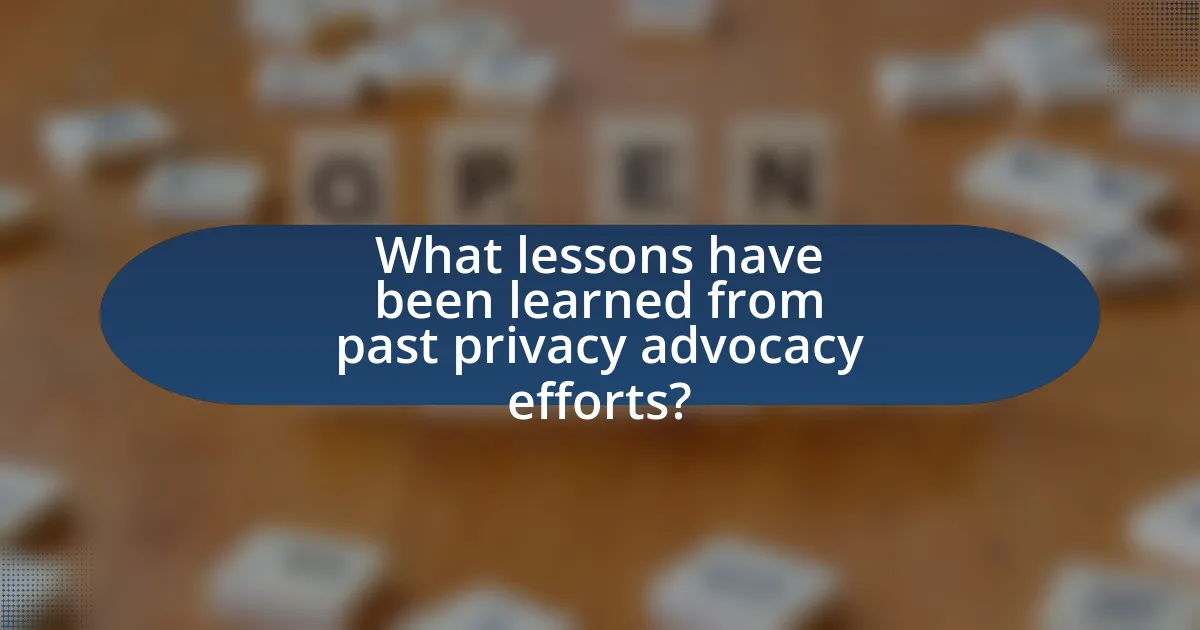
What lessons have been learned from past privacy advocacy efforts?
Past privacy advocacy efforts have highlighted the importance of engaging diverse stakeholders to create comprehensive privacy protections. Effective advocacy has shown that collaboration among technologists, policymakers, and civil society organizations leads to more robust privacy frameworks. For instance, the European Union’s General Data Protection Regulation (GDPR) emerged from extensive consultations with various groups, demonstrating that inclusive dialogue can result in stronger legal protections. Additionally, past efforts have revealed the necessity of clear communication to raise public awareness about privacy issues, as seen in campaigns that successfully mobilized grassroots support for privacy legislation. These lessons underscore the need for a multifaceted approach in privacy advocacy to achieve meaningful change.
What common challenges do privacy advocates face?
Privacy advocates commonly face challenges such as lack of public awareness, legislative hurdles, and technological advancements that outpace regulatory frameworks. The general public often lacks understanding of privacy issues, making it difficult for advocates to garner support for stronger protections. Legislative hurdles arise when policymakers prioritize economic interests over privacy concerns, leading to inadequate laws. Additionally, rapid technological advancements, such as artificial intelligence and data analytics, create new privacy risks that existing regulations may not adequately address, complicating advocacy efforts. These challenges hinder the effectiveness of privacy advocacy and require ongoing adaptation and education to overcome.
How can these challenges be effectively addressed?
To effectively address challenges in privacy advocacy, organizations should implement comprehensive education and awareness programs that inform stakeholders about privacy rights and risks. Research indicates that informed individuals are more likely to engage in privacy-protective behaviors, as evidenced by a study from the Pew Research Center, which found that 81% of Americans feel they have little control over their personal information online. Additionally, fostering collaboration among advocacy groups, policymakers, and technology companies can lead to more robust privacy protections, as demonstrated by successful initiatives like the General Data Protection Regulation (GDPR) in Europe, which resulted from multi-stakeholder engagement.
What are the consequences of failing to address these challenges?
Failing to address challenges in privacy advocacy can lead to significant erosion of public trust in institutions. When privacy concerns are ignored, individuals may experience increased vulnerability to data breaches, surveillance, and misuse of personal information. This can result in a chilling effect on free expression, as people may refrain from sharing their thoughts or engaging in open discourse due to fear of being monitored. Additionally, organizations may face legal repercussions and financial losses due to non-compliance with privacy regulations, such as the General Data Protection Regulation (GDPR), which imposes hefty fines for violations. Ultimately, neglecting these challenges undermines the effectiveness of privacy advocacy efforts and can perpetuate a cycle of distrust and disengagement among the public.
What successful case studies exist in privacy advocacy?
Successful case studies in privacy advocacy include the European Union’s General Data Protection Regulation (GDPR) implementation, which has set a global standard for data protection and privacy rights. The GDPR, enacted in 2018, has empowered individuals with greater control over their personal data and has led to significant fines for non-compliance, such as the €50 million fine imposed on Google by the French data protection authority for violations. Another notable case is the California Consumer Privacy Act (CCPA), which took effect in 2020, granting California residents enhanced rights regarding their personal information and influencing similar legislation across the United States. These case studies demonstrate effective strategies in privacy advocacy by establishing comprehensive legal frameworks that prioritize individual privacy rights and enforce accountability among organizations.
What strategies were employed in these successful cases?
Successful cases of privacy advocacy employed strategies such as coalition-building, public awareness campaigns, and legislative engagement. Coalition-building involved uniting various stakeholders, including civil society organizations, legal experts, and affected individuals, to create a stronger collective voice. Public awareness campaigns utilized social media and traditional media to educate the public about privacy issues, thereby increasing public support and pressure on policymakers. Legislative engagement focused on directly influencing lawmakers through lobbying efforts, providing expert testimony, and drafting model legislation to promote stronger privacy protections. These strategies have proven effective in advancing privacy rights and shaping policy outcomes.
How can these strategies be replicated in other contexts?
These strategies can be replicated in other contexts by adapting the core principles of effective communication, stakeholder engagement, and evidence-based advocacy. For instance, organizations can tailor messaging to resonate with different audiences, ensuring that privacy concerns are framed in a way that aligns with their specific interests and values. Additionally, leveraging data and case studies from successful privacy advocacy efforts can provide a solid foundation for building credibility and support in new environments. Research indicates that contextualizing advocacy efforts increases their effectiveness, as seen in the work of the Electronic Frontier Foundation, which successfully adapted its strategies across various campaigns to address diverse privacy issues.
What mistakes should privacy advocates avoid?
Privacy advocates should avoid overgeneralizing threats to privacy, as this can lead to misinformation and weaken their credibility. When advocates make broad claims about surveillance or data misuse without specific evidence, they risk alienating potential allies and diminishing public trust. For instance, a study by the Pew Research Center found that nuanced discussions about privacy issues are more effective in engaging the public than alarmist rhetoric. Additionally, privacy advocates should refrain from ignoring the importance of transparency in their own practices, as failing to disclose funding sources or affiliations can undermine their legitimacy.
What are the most common pitfalls in privacy advocacy?
The most common pitfalls in privacy advocacy include a lack of clear messaging, insufficient understanding of legal frameworks, and failure to engage diverse stakeholders. Clear messaging is crucial; without it, advocates may struggle to communicate the importance of privacy issues effectively, leading to public confusion or apathy. Insufficient understanding of legal frameworks can result in advocates inadvertently promoting solutions that are not feasible or compliant with existing laws, undermining their credibility. Additionally, failing to engage diverse stakeholders, including marginalized communities, can lead to advocacy efforts that do not address the needs of all affected groups, ultimately limiting the impact of privacy initiatives. These pitfalls have been observed in various advocacy campaigns, highlighting the need for strategic planning and inclusive approaches.
How can advocates learn from these mistakes to improve future efforts?
Advocates can learn from past mistakes by conducting thorough evaluations of previous campaigns to identify what strategies were ineffective. By analyzing data from these efforts, such as engagement metrics and feedback from stakeholders, advocates can pinpoint specific areas for improvement. For instance, a study by the Berkman Klein Center for Internet & Society at Harvard University highlights that understanding audience perceptions and tailoring messages accordingly significantly enhances advocacy effectiveness. This evidence supports the notion that learning from past errors, through data-driven analysis and audience engagement, leads to more successful future advocacy initiatives.
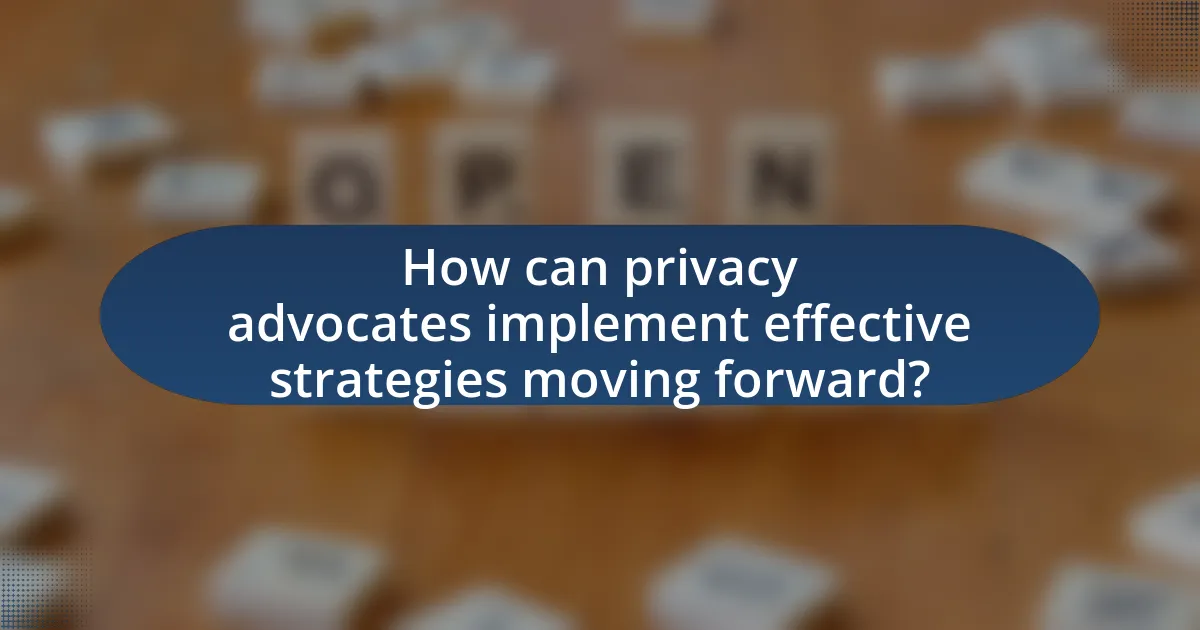
How can privacy advocates implement effective strategies moving forward?
Privacy advocates can implement effective strategies moving forward by focusing on education, collaboration, and policy engagement. Education initiatives can raise public awareness about privacy rights and data protection, as evidenced by campaigns that have successfully informed citizens about their digital rights, leading to increased advocacy participation. Collaboration with technology companies and civil society organizations can foster innovative solutions that prioritize user privacy, demonstrated by partnerships that have developed privacy-enhancing technologies. Additionally, engaging with policymakers to influence legislation, such as the General Data Protection Regulation in Europe, can create a more robust legal framework for privacy protection, showcasing the impact of advocacy on shaping effective privacy laws.
What best practices should be adopted for privacy advocacy?
Best practices for privacy advocacy include promoting transparency, educating the public about data rights, and engaging in policy advocacy. Transparency involves clearly communicating how personal data is collected, used, and shared, which builds trust and empowers individuals to make informed choices. Education is crucial; studies show that informed individuals are more likely to take steps to protect their privacy, such as using privacy settings and understanding consent. Engaging in policy advocacy means actively participating in legislative processes to influence laws that protect privacy rights, as seen in successful campaigns for data protection regulations like the General Data Protection Regulation (GDPR) in Europe. These practices collectively enhance the effectiveness of privacy advocacy efforts.
How can advocates measure the effectiveness of their strategies?
Advocates can measure the effectiveness of their strategies by utilizing specific metrics such as policy changes, public awareness levels, and stakeholder engagement. For instance, tracking the number of legislative proposals influenced or passed as a result of advocacy efforts provides a clear indicator of success. Additionally, surveys assessing public awareness before and after campaigns can quantify shifts in perception, demonstrating the impact of advocacy on community understanding of privacy issues. Engaging with stakeholders through feedback mechanisms can also reveal the effectiveness of communication strategies and identify areas for improvement.
What tools and resources are available to support advocacy efforts?
Advocacy efforts can be supported by various tools and resources, including social media platforms, advocacy software, and educational materials. Social media platforms like Twitter and Facebook enable organizations to reach a broad audience and mobilize support quickly. Advocacy software, such as NationBuilder or Mobilize, provides functionalities for organizing campaigns, managing contacts, and tracking engagement. Educational materials, including reports, webinars, and workshops, equip advocates with knowledge and strategies to effectively communicate their messages and influence policy. These resources collectively enhance the capacity of advocacy groups to engage stakeholders and drive change in privacy-related issues.
What innovative approaches can enhance privacy advocacy?
Innovative approaches that can enhance privacy advocacy include the use of technology-driven solutions, such as decentralized identity systems and blockchain for data protection. These technologies empower individuals to control their personal information and reduce reliance on centralized entities that may compromise privacy. For instance, decentralized identity systems allow users to manage their identities without exposing sensitive data to third parties, thereby minimizing the risk of data breaches. Additionally, employing artificial intelligence to analyze privacy policies can help identify gaps and promote transparency, enabling advocates to better inform the public about their rights. These methods not only strengthen individual privacy but also foster a culture of accountability among organizations handling personal data.
How can technology be leveraged for better advocacy outcomes?
Technology can be leveraged for better advocacy outcomes by utilizing data analytics, social media platforms, and digital communication tools to enhance outreach and engagement. Data analytics allows advocacy groups to identify trends and target specific demographics effectively, leading to more informed strategies. Social media platforms facilitate real-time communication and mobilization, enabling advocates to reach larger audiences quickly; for instance, campaigns like #MeToo have demonstrated the power of social media in raising awareness and driving change. Digital communication tools, such as email campaigns and webinars, provide cost-effective ways to educate and engage supporters, fostering a more informed and active community. These methods collectively enhance the effectiveness of advocacy efforts by increasing visibility, engagement, and the ability to mobilize support.
What role does social media play in modern privacy advocacy?
Social media serves as a crucial platform for modern privacy advocacy by facilitating awareness, mobilization, and community engagement around privacy issues. It enables advocates to disseminate information rapidly, reaching a broad audience and fostering discussions on privacy rights and data protection. For instance, campaigns like #DeleteFacebook have highlighted concerns over data privacy and corporate surveillance, leading to increased public scrutiny and legislative discussions. Additionally, social media allows for real-time updates on privacy-related events and policies, empowering users to take action and participate in advocacy efforts. This dynamic interaction between advocates and the public enhances the visibility of privacy issues and encourages collective action for stronger privacy protections.
What practical tips can enhance privacy advocacy efforts?
To enhance privacy advocacy efforts, individuals and organizations should prioritize education and awareness campaigns that inform the public about privacy rights and risks. Research indicates that informed citizens are more likely to engage in advocacy, as seen in studies showing that awareness initiatives can increase public participation in privacy-related discussions by up to 40%. Additionally, leveraging social media platforms for outreach can amplify messages, reaching wider audiences and fostering community engagement. Collaborating with technology experts to provide clear, actionable guidelines on privacy protection can also empower individuals to take proactive steps, thereby strengthening advocacy efforts.
